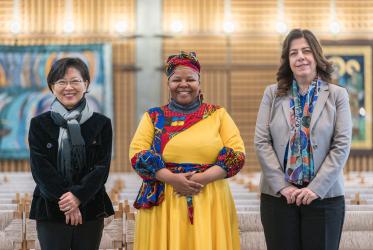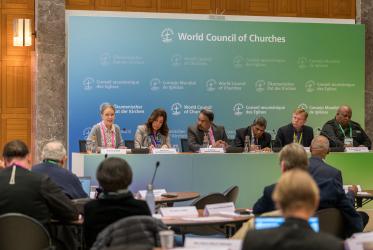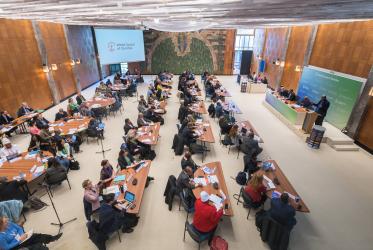Excellencies, distinguished leaders, guests and peacemakers,
We are today gathered in the City of Peace, Geneva for the 52nd session at the Human Rights Council at this side event to present the report “Assessing the impact of sanctions on humanitarian work.”
Thanks for organizing this side event. It´s an honor to be present with you. I have to mention that I´m replacing my colleague Peter Prove, director of International affairs, World Council of Churches.
The World Council of Churches promotes Christian unity in faith, witness and service for a just and peaceful world. An ecumenical fellowship of churches founded in 1948, today the WCC brings together 352 Protestant, Orthodox, Anglican and other churches representing more than 580 million Christians in over 120 countries, and works cooperatively with the Roman Catholic Church.
I hope you have a copy of the report onsite or online, “Assessing the impact of sanctions on humanitarian work,” released by the Geneva Graduate Institute in partnership with the World Council of Churches (WCC), ACT Alliance, Caritas Internationalis, and the World Evangelical Alliance.
The analysis is based on semi-structured interviews with 20 humanitarian practitioners and five sanctions experts working for the UN or conducting academic research on the impact of sanctions on humanitarian work.
The reports’s key recommendations include advocating for more general humanitarian exemptions; collaborating with relevant UN bodies to coordinate advocacy measures; and engaging in multi-stakeholder consultations with sanctioning governments.
Recommendations also include continuing to document the impact of sanctions on humanitarian assistance and coordination of information-sharing with constituencies of the organizations whose humanitarian work is affected by sanctions.
The issue of the negative impacts of international sanctions was addressed at the WCC 11th Assembly in Karlsruhe 2022, notably in the Statement “The Things That Make For Peace.”
I will quote a few things in the statement:
"If you, even you, had only recognized on this day the things that make for peace! But now they are hidden from your eyes." (Luke 19:42)
As we met in the World Council of Churches 11th Assembly in Karlsruhe, Germany, almost three years since the emergence of the global COVID-19 pandemic, we must acknowledge with deep pain and dismay that violence and conflict continue to impact vulnerable communities, especially the elderly, women, children, and youth.
We meet in a time of renewed and escalating global polarization, reconfiguration of governance and geopolitical alignments, division, confrontation, and militarization - as well as of continuing military occupations in situations such as the Occupied Palestinian Territories and Cyprus - with all the appalling risks that attend this context. In the community, grave concerns are being raised in the ecumenical fellowship about the instrumentalization of religious language, authority, and leadership to justify, support or “bless” armed aggression or any kind of violence and oppression, in sharp contrast to the Christian calling to be peacemakers and contradicting core ecumenical principles.
The calling to dialogue, encounter, and the pursuit of mutual understanding is the very essence of ecumenism and central to peace-making. It is the role of churches to embody “Christ’s love [that] moves the world to reconciliation and unity.”
The WCC 11th Assembly therefore:
Calls, for a global ceasefire, as an urgent moral imperative, in all armed conflicts around the world, and for parties to such conflicts to engage and persist in dialogue and negotiations until just and sustainable peace can be achieved, and to abstain from war.
Urges WCC member churches and partners to actively support and accompany the Korean churches in their advocacy by carrying forward the heritage of the Busan Assembly affirmed by the Statement on Peace and Reunification of the Korean Peninsula.
Urges support for the churches and peoples of Syria, Cuba, Venezuela and Zimbabwe in the midst of oppression due to international sanctions that affect these populations’ human rights and dignity. Churches have been crucial agents working for better relationships despite the limitations and barriers caused by sanctions.
Calls for the lifting of sanctions and/or addressing the negative impacts of such sanctions on ordinary people in countries such as Syria, Cuba, Venezuela and Zimbabwe, and encourages further study of the effectiveness of international sanctions against perpetrators of violence and oppression, and the negative impacts of insufficiently targeted sanctions on ordinary people, and on humanitarian response, social service, and peacebuilding - especially by churches and related organizations - in affected countries.
In the discussions at the assembly:
In the experience of the WCC, sanctions and other economic measures rarely achieve their stated purposes, and invariably do significant harm to the civilian population, especially women, children, and other vulnerable groups. Syria is an important case in point. International and unilateral sanctions are contributing to worsening the humanitarian situation, harming a civilian population already made vulnerable by war. Moreover, sanctions are damaging the historical multicultural and multireligious fabric of the Syrian society, forcing Christians and other Indigenous groups to flee the country.
Meanwhile, I´m asked by the other panelists to focus on the Korean Peninsula.
The World Council of Churches’ commitment to engaging in efforts for peace and reunification on the Korean Peninsula is deep and long-term. It dates back to the mid-1980s. North and South Korean Christians first met in 1986 in Glion, Switzerland, under the auspices of the WCC. Since then, communications, meetings and visits between WCC (and its South Korean and other member churches and partners around the world) and the Korean Christian Federation (KCF) of the DPRK have continued semi-regularly over the intervening years, up until COVID-19 pandemic.
On the South Korean side, the National Council of Churches in Korea (NCCK) has served as the key counterpart to the KCF in the North. Together, NCCK and KCF have been the twin reference points around which international ecumenical solidarity and support has gathered. This international ecumenical solidarity has taken shape in the form of the Ecumenical Forum for Peace, Reunification and Cooperation on the Korean Peninsula (EFK) originally established in 2006. EFK emerged following the church response to the 1990s famine in North Korea, with significant volumes of food aid and other humanitarian supplies having been delivered to the North from and through ecumenical channels. That diaconal engagement with North Korea by churches and church-based organizations has continued, albeit at a much less intensive level, again up until COVID-19 struck.
Of even greater importance in this regard is the question of sanctions. We have two main arguments against the sanctions imposed on the DPRK.
Firstly, they have quite self-evidently failed in achieving their stated purpose – which was to prevent North Korea from acquiring nuclear weapons.
Secondly, though having failed to prevent nuclear proliferation, the sanctions have been very effective indeed in obstructing humanitarian access and assistance to the people of North Korea. Despite the availability of humanitarian exemptions, in practice these have been very difficult and cumbersome to obtain, and must be secured on a case-by-case basis. But the humanitarian “exception” should in fact be the rule.
As representatives of the Red Cross have observed, you shouldn’t have to get approval to respond to people in need. Moreover, the ripple effect of the sanctions has impeded humanitarian assistance in other indirect but very serious ways, especially with banks and financial institutions unwilling to take the risk of facilitating financial transfers even when OFAC licences have been granted. As a result, the North Korean people have suffered greatly from the international community’s sanctions that have already failed. So why maintain them, especially at their “maximum pressure” settings?
On top of this we must add the counter-productive impact of the maximum pressure sanctions in the geo-political context. It is apparent that the break in the latest political dialogue process came as a result of the US’s unwillingness to contemplate even incremental relaxation of the sanctions, and to pursue a step-by-step process towards peace and denuclearization. Consequently, a rare and promising opportunity for achieving a sustainable peace in the region and of removing a major risk of potentially catastrophic conflict has been squandered.
Of course, both the humanitarian and political contexts have been considerably worsened by the COVID-19 pandemic and its impacts. Border closures to prevent COVID transmission have cut off essential supplies to North Korea, especially from China, with economic and humanitarian consequences that must be assumed to be severe. They have also precluded the visits and exchanges upon which our people-to-people process of dialogue, encounter and cooperation between North and South Koreans has been based. Consequently, we have lost a lot of momentum, while we wait for the conditions globally to improve.
But peace cannot wait, while tensions and conflict risks escalate. And hope and trust is in the nature of our faith, even in the midst of such discouraging circumstances. Therefore we must renew and strengthen our commitment and the efforts we make together for peace and reunification on the Korean Peninsula, despite the obstacles.
In conclusion, everything that increases rather than reduces tensions – including provocative military exercises and maximum pressure sanctions – or that prevents people-to-people encounter, is a conflict risk and an obstacle to peace. And everything that prevents a compassionate humanitarian response to the suffering of others is contrary to Christian principles of love and care for one’s neighbour in need.
I pray that we will, through our fellowship and collaboration and with God’s help, find the wisdom and strength to overcome all such obstacles to a better future for all the people of the Korean Peninsula, and of the world.
Thanks for your attention.





